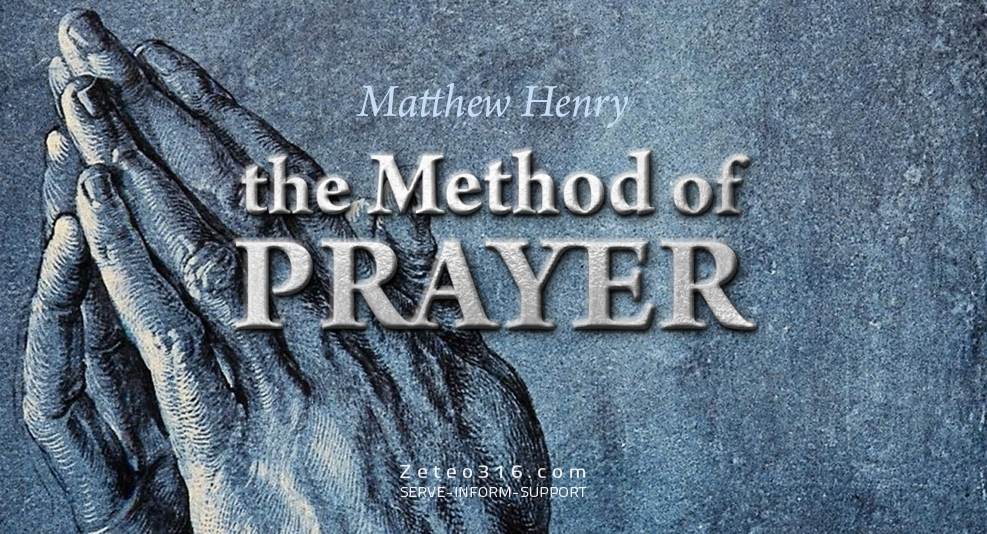
Matthew Henry is perhaps best known for his Bible Commentary. I first came across him when I downloaded my first copy of the E-Sword Bible program. His commentary is available as a free download. Henry (1662-1714) died after finishing Genesis through to Acts. The rest of his commentary was finished by friends utilizing his notes.
But Henry also wrote a valuable manual on prayer. I only discovered this after stumbling across the book “Taking Hold of God – Reformed and Puritan Perspectives on Prayer” edited by Joel Beeke and Brian G. Najapfour. Some of the material below is drawn form Chapter 8 (written by Beeke) titled “Matthew Henry on a Practical Method of Daily Prayer.”
In his chapter, Beeke references Ligon Duncan who edited a book on Henry and his method of Prayer. See A Method for Prayer: Freedom in the Face of God. The following excerpt of an article by Duncan is an intriguing insight into Henry’s Method of Prayer:
I first “met” this book [A Method for Prayer] through the suggestion of one of my seminary professors, Dr. O. Palmer Robertson. A number of us in his Old Testament Biblical Theology course were deeply encouraged by Dr. Robertson’s peculiar power in public prayer (we would get to class early just to make sure that we didn’t miss his prayers!). So we inquired as to what had helped him in prayer. He replied “the Bible and Matthew Henry’s A Method for Prayer.” I won the race to the library.
Have you ever heard of anyone making sure they get to class (or sermon) so as not to miss out on the opening prayer? What is going on here? Beeke also notes that: “The great evangelist George Whitefield (1714-1770) repeatedly read through Henry’s during his devotions and found it rich food for his soul.” Given this, perhaps we all ought to pay attention to what Matthew Henry wrote about prayer.
In his diary, Henry wrote that prayer is “that which buckles on all the Christian’s armour.” He also provided Three Directives.
Directive One: Begin Every Day with God
Citing Psalm 5:3, he wrote, “It is our wisdom to begin every day with God.” Why do we pray? Beeke reminds us that part of the reason is that, “God requires us to pray to remind us of His authority over us and His love and compassion toward us.” Henry notes that we must give God His rightful titles and honor as we pray. Begin every day with God.
Directive Two: Spend Every Day with God
Henry and Beeke cite Psalm 25:5 Lead me in your truth and teach me, for you are the God of my salvation; for you I wait all the day long. The message is to spend the day waiting upon the Lord and finding occasions to pray. Beeke sums it up this way:
Wherever you go, whatever you do each day, search for abundant reasons for prayer and praise, Henry said. As James wrote, if you are sad, then pray to God; if you are happy, then sing praises to God (James 5:15). That covers all life.
Directive Three: Close Every Day with God
In peace I will both lie down and sleep, for You alone, O LORD, make me to dwell in safety. Psalm 4:8
Drawing on Henry, Beeke observes:
Bedtime also offers an opportunity to reflect upon both our mortality and our Christian hope. Henry encouraged us to think that just as we retire from work for a time when we go to bed, so we shall retire for a time in death until the day of resurrection. Just as we take off our clothes at night, so we will put off this body until we receive a new one the morning of Christ’s return.
Matthew Henry’s Pattern for Prayer included: Adoration (God’s attributes); Confession; Petition for ourselves; Thanksgiving; Intercession for others; and Conclusion.
Beeke noted that, “At the heart of Henry’s method is praying in the words of Scripture – that is, praying God’s word back to God.” He cites O. Palmer Robertson:
…prayer in this form is nothing more and nothing less than what the old Puritans called ‘pleading the promises.’ God has made promises to His people. His people respond by redirecting those promises to the Lord in the form of prayer.
A lot more can be said but it is beyond the scope of this article. We’re fortunate that several books have been written on Henry’s Method for Prayer. Ligon Duncan’s book was linked to above. Robertson has also written one published by Banner of Truth.
Moreover, Method for Prayer can be downloaded for free in PDF format HERE. And Ligon Duncan’s edited and revised edition can be found online to read for free HERE.
If you do get a chance, I recommend reading “Taking Hold of God.” In this article I focused on Matthew Henry, but the book is filled with many more precious nuggets from others on prayer. John Bunyan is one example. See also our previous article Praying With ACTS.
